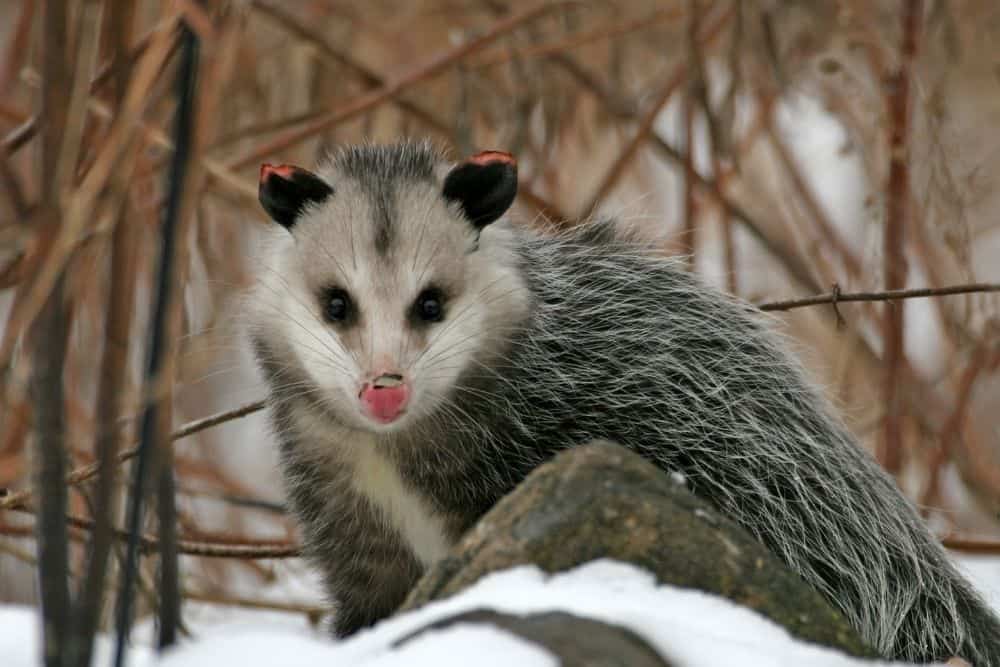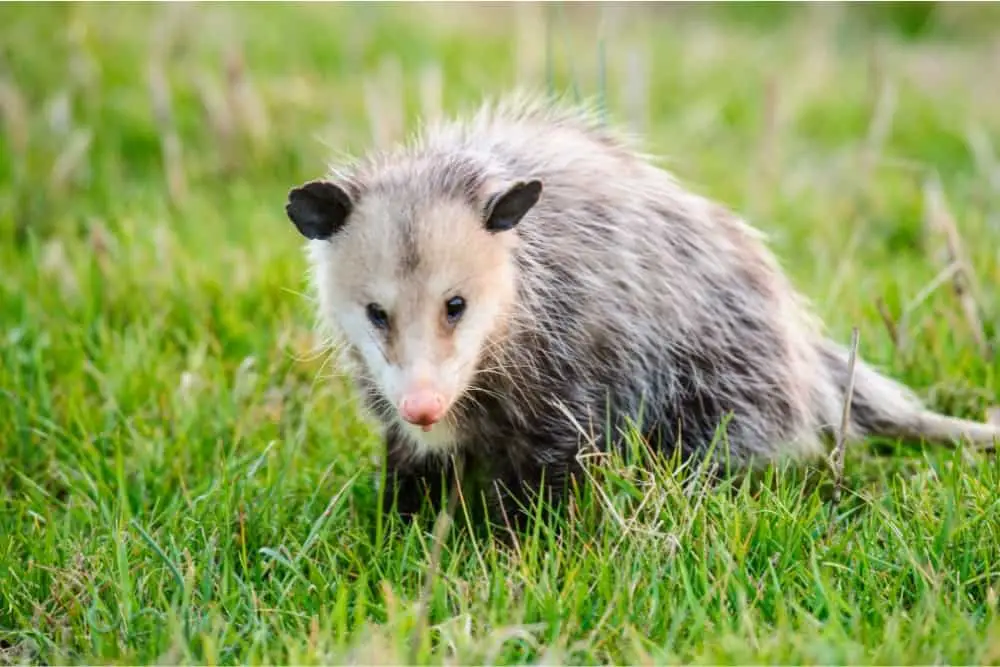Opossums are one of America’s most notorious scavengers.
Feasting on the scraps from garbage bins, roadkill, and virtually any small animal that crosses their path, it’s only natural to assume that these marsupials are prone to catching deadly diseases that can be spread amongst other animals and humans.
Their unusual appearance doesn’t exactly help this assumption.

That assumption is partly true. Opossums are prone to a variety of diseases that can be spread to other animals, domestic pets, and humans, but what about the biggest disease of all – rabies?
What Exactly Is Rabies?
Rabies is a rare but dangerous disease that is spread from the scratch, bite, or exposure to saliva from an infected animal.
The most common animals that catch rabies are foxes, rabbits, bats, and skunks, all of which can easily infect a domestic dog, which can then lead to human infection.
Fortunately, there is a vaccination and similar treatments for infected individuals.
If left untreated, the infected animal or human will cause inflammation to the brain, which leads to a variety of horrible symptoms.
In America, the most common source of rabies infected amongst humans is from bats and domestic dogs.

So…Can Opossums Get Rabies?
While it’s not impossible, the Opossum has many genetic traits that significantly reduce its ability to contract rabies. And, in the unlikely event it does contract the rabies virus, an opossum is likely to recover without spreading the virus.
Here is a look at a 2013 breakdown of reported rabies cases:
- 1,898 raccoons (32.4%)
- 1,598 bats (27.2%)
- 1,447 skunks (24.7%)
- 344 foxes (5.9%)
- 247 cats (4.2%)
- 86 cattle (1.5%)
- 89 dogs (1.5%).
in this same report, 2 opossums total, were included in “other” wildlife.
It’s a common misconception that opossums can catch and spread rabies like other scavenger animals (such as raccoons and skunks) due to their exposure to bacteria and other potential viruses.
How Opossums Respond to Rabies Exposure
The reason why opossums aren’t as likely to contract rabies or die from rabies, is because opossums have a naturally low body temperature.
Rabies requires a particular body temperature to survive – in fact, the virus cannot survive in most normal temperatures.
It seems ironic that for an animal like an opossum that exists off scavenging for food that they probably won’t get rabies, but their scavenging lifestyle means that their immune systems have evolved to serve them well.
This immune system will slow down the multiplication of the virus, so even if the viral parts manage to linger in the opossum’s low-temperature body, it probably won’t multiply enough to be a real risk.
Even if an opossum catches rabies, the virus isn’t likely to survive in the marsupial due to their low body temperature which is an inhabitable environment for the virus to survive and spread.
Still, this doesn’t mean that it’s impossible for an opossum to not catch and spread rabies.
Young opossums will have a weaker immune system compared to their adult counterparts, which makes them more prone to catching any type of disease. And opossums with an elevated temperature become susceptible.
What Diseases Do Opossums Carry?
Just because the chances of an opossum getting rabies are very small, it doesn’t mean they are immune to other diseases.
Sure, these marsupials might have a strong immune system due to their scavenging lifestyles, but they’re not exempt from other nasty infections and viruses.
Here are some of the most common diseases carried by opossums:
Bovine Tuberculosis (TB)
Opossums are known to carry and transmit bovine tuberculosis amongst deer and cattle, which is why these marsupials are considered vermin to some farmers.
The most common symptom of tuberculosis are large boils that are filled with the bacteria, which then leads to weakness, enlarged lymph nodes, fever, and even death.
Leptospirosis
Leptospirosis is a blood infection carried by wild animals that can affect dogs and humans.
The bacteria are generally spread by exposure to bodily fluids such as urine found in contaminated bedding, plants, soil, foods, and water.
This infection spreads to the liver and kidneys resulting in liver and kidney failure, and can be treated with antibiotics.
This is why it’s really important to have your dogs up to date on Lepto vaccines…especially if they have access to possum (or rats) on a regular bases.
Salmonella
Opossums can carry one of the most common bacterial infections in the world – salmonella.
This is mostly because opossums will eat virtually anything, including contaminated foods, and they often won’t exhibit symptoms of the illness themselves due to their strong immune systems.
If a human comes into contact with an infected opossum or anything it has contaminated, however, this can spread the bacteria, leading to vomiting and diarrhea. You can read more about salmonella here.
Tularemia
If a human comes into contact with an opossum or its fleas, they could catch tularemia, which results in a horribly high fever.
Some cases have led to an ulcer or even pneumonic tularemia, which can lead to difficult breathing.
Fleas
As with virtually any animal, opossums are prone to catching fleas. This is an inevitable problem due to their scavenging lifestyles – especially if they consume flea-ridden roadkill.
This is why most people don’t like to have opossums in their backyards where the fleas could latch on to domestic animals like dogs and cats. As for ticks, definitely read this article here about opossums and ticks.
Conclusion
To conclude, it is very rare for an opossum to get and spread rabies.
This is because rabies thrives in animals with a high body temperature, and while opossums are scavengers that can pick up a multitude of bacteria, their low body temperature means their bodies are an inhospitable environment for rabies to thrive.
If you see an opossum playing dead, foaming at the mouth, or swaying around as if it is sick – don’t worry too much. This is a defense mechanism adapted by opossums to trick predators into thinking they are sick.
That doesn’t mean to approach the opossum. Use good sense and leave the animal alone or be on the safe side and call animal control.
